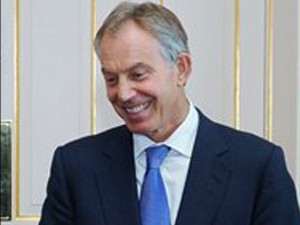In troubled world, Games bind political wounds
LONDON—Two days from the start of the Olympics, former British Prime Minister Tony Blair has defended his decision to deliver the Games to London, maintaining that the event will be value for money as austerity hits other public projects.
Blair helped to deliver the world’s biggest sporting showpiece to London in 2005, landing Britain with a bill hitting $14.4 billion (9.3 billion pounds) for a project taxpayers had to foot as the economic crisis took hold after he left office in 2007.
“Even though it’s a lot of money, we have regenerated a whole part of the East End of London,” Blair said on Wednesday in an interview with The Associated Press.
He pointed to the “great sporting facilities” now in place, and “the excess of 9 billion” the country stood to make.
“If you were to pose the question to (fellow bidders) Paris or Madrid or New York … ‘Would you prefer to be putting on the Olympics right now?’ I’m sure they would say ‘Yes,’” he said.
On securing the Olympics in 2005, a then prosperous Britain predicted it would cost 2.4 billion pounds. But since then, the country has plunged into recession, and costs have spiraled as a former east London industrial wasteland was turned into a 226-hectare urban park with the Olympic Stadium at its heart.
Blair said when he left government after a decade in power in 2007, the economy was strong and unemployment was low. “Post the financial crisis, everything looks harder and tougher for Britain,” he said. “The question is how we get out of it?”
Blair—appearing at a conference in London organized by Beyond Sport, a group that uses sports to promote social development—described the Games as “an opportunity to showcase modern Britain, modern London” to the world. “It’ll be a great opportunity for us, which I’m sure we will seize with both hands.”
He also described the Games as a rare opportunity to unite countries with troubled relations.
“It’s really hard to think of an another event, like the Olympics, that can bring people together—even if they’ve got the most profound political disagreements and even if their countries are going through turmoil,” said Blair, who serves as special envoy for the Quartet on the Middle East, a diplomatic peace initiative.
He highlighted the participation of female Saudi athletes for the first time, alongside Israelis and people from all over the Middle East.
The Olympics is “a fantastic celebration of the fact that it is possible for sport to bring people together in a way that nothing else does,” he said.
Sport builds legacy
Blair said that the opportunity must not be squandered to use the Games to transform lives beyond the Olympic Park.
“The important thing for us … is to use the Olympics to build a legacy in the country,” Blair said. “And that legacy has got to be around sport, what it can do, how it can change people’s lives because I think sport for me is a really important part of modern policy.
“It’s a great anticrime policy, social policy, education policy, health policy—it’s not just about the pleasure of playing sport.” AP
